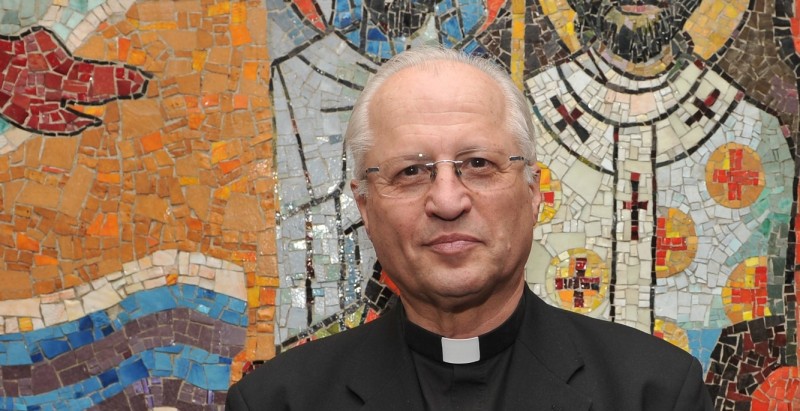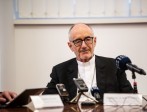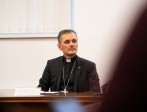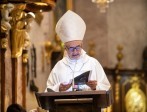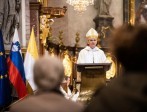Uvodni pozdrav in uvod v mašo
Spoštovani predsednik republike gospod Borut Pahor,
spoštovani predsednik državnega zbora dr. Milan Brglez,
spoštovani predsednik vlade dr. Miro Cerar,
spoštovani predsednik državnega sveta gospod Mitja Bervar!
Spoštovani predstavniki družbenega, političnega, kulturnega in gospodarskega življenja, evropski in državni poslanci! Spoštovani predstavniki slovenske vojske in policije, predstavniki drugih cerkva in verskih skupnosti, gospod dekan TEOF, izbrani gostje, ekscelence veleposlaniki v Republiki Sloveniji z dekanom diplomatskega zbora apostolskim nuncijem v RS na čelu!
Pozdrav vsem sobratom v škofovski in duhovniški službi! Lep pozdrav predstavnikom vojaškega vikariata, višjim redovnim predstojnikom in predstojnicam, redovnikom, redovnicam, bogoslovcem, vsem liturgičnim sodelavcem in vsem, ki smo se tu v stolnici ali prek valov Radia Ognjišče nocoj, na kresni večer in predvečer dneva državnosti, zbrali, da bomo skupaj molili za našo domovino.
Obžalujmo svoje grehe, posebej grehe proti bližnjim in skupnosti, da bomo vredni opraviti svete skrivnosti.
Nagovor
Dragi sobratje, cenjeni gostje, dragi bratje in sestre!
Naš krščanski način praznovanja glavnega praznika dneva državnosti se vedno bolj kaže v molitvi. Hvaležen sem vsem, ki že več let organizirate devetdnevnico molitve in posta za domovino. Molitev je potrebna za vse, ki v našem imenu vodijo državo, da bi jo vodili modro. Za to potrebujejo modrost, dar razločevanja in pomoč za pametno razmišljanje in pravilno odločanje. Celotnemu narodu pa izprosimo milost sprave in pripravljenost za odpuščanje, sožitje in medsebojno spoštovanje.
1. Rojstni dan naše države in domovine Slovenije se povezuje s praznikom rojstva Janeza Krstnika. Vsaj od časa sv. Avguština praznujemo v Cerkvi ta praznik 24. junija. Datum so določili šest mesecev pred praznikom Jezusovega rojstva, 25. decembra, kakor je nadangel Gabrijel napovedal Mariji. To je edini svetnik, poleg Matere Božje, pri katerem praznujemo rojstvo za nebesa (mučeništvo) pa tudi telesno rojstvo. Rimski martirologij ob tem piše: »Slovesni praznik rojstva Janeza Krstnika, Gospodovega predhodnika; že v naročju matere, ki je bila napolnjena s Svetim Duhom, se je zganil od veselja zaradi prihoda človekovega odrešenja; njegovo rojstvo samo je že bilo prerokba Kristusa Gospoda; v njem je zasijalo obilje milosti, kajti sam Gospod je rekel glede njega, da med rojenimi od žena ni večjega od Janeza Krstnika.«
Lika Janeza Krstnika ni lahko razumeti. Bil je tako velik, a je nato kot Jezusov predhodnik umrl v ponižanju. On sam nam je povedal, kdo je: Sem glas, glas v puščavi. A je glas brez Besede, kajti Beseda ni on, je nekdo drug. To je skrivnost Janeza Krstnika. Nikoli se ne polasti Besede. Janez je tisti, ki kaže, ki usmerja. Praznik obhajamo v času, ko je najdaljši dan v letu, ko je največ svetlobe. In res je bil človek luči, prinašal je luč, a ni bil on luč; bil je odsev luči. Janez je kot luna. Bil je glas, a ne beseda, bil je luč, a ni imel lastne luči.
Ko motrimo življenje tega človeka, tako velikega, tako vplivnega – vsi so mislili, da je on Mesija – ko motrimo to življenje, kako se poniža v temo v ječi, motrimo veliko skrivnost. Vemo, da so ga obglavili, da je bila glava poklon plesalke Herodiadine hčere pokvarjeni materi Herodovi ženi. Janez Krstnik je namreč Herodu očital, da mu ni dovoljeno živeti z ženo svojega brata. Sledilo je maščevanje in Janezovo obglavljenje. Večje ponižanje ni mogoče, kot je končal Janez Krstnik.
Lik Janeza Krstnika govori o Cerkvi: Cerkev obstaja zato, da oznanja, da je glas Besede, svojega ženina, ki je Beseda. Cerkev obstaja, da glas Besede oznanja vse do mučeništva, ali še bolj konkretno, do mučeništva v rokah mogočnežev tega sveta. Tudi danes mora biti Cerkev glasnica resnice o človekovih pravicah, o svetosti zakona in družine, zlasti pa zagovornica in glasnica pravic ubogih, brezpravnih, ob vedno večji kristjanofobiji pa tudi pravic vernih. O tem je pred kratkim spregovoril vatikanski tajnik za odnose z državami nadškof Paul Richard Gallagher, ko je opozoril Evropski svet, naj se zavzame za spoštovanje verske svobode.
2. Letos se zahodni svet, ki je bil vedno krščanski – danes žal vedno manj – spominja 800. obletnice, kar je bila napisana Magna carta libertatum – Velika listina svoboščin – v Evropi in pozneje v Ameriki. Čeprav so jo mnogokrat razlagali enostransko, je veliko prispevala k razumevanju dostojanstva človeške osebe in svobode posameznika. Njena temeljna načela so nekakšna osnova humanistične zapuščine zahodnega sveta in so zapisana v splošni deklaraciji človekovih pravic iz leta 1948 in konvenciji o varovanju človekovih pravic in temeljnih svoboščin iz leta 1950. Od 63 določb te listine svoboščin sta še danes v veljavi in splošno sprejeti dve: svoboda delovanja verskih skupnosti in pravica do pravnega postopka oz. sodnega varstva, kar pomeni po današnjem gledanju, da nihče ne sme biti pridržan ali zaprt brez dokaza, da je storil kaznivo dejanje, skratka, promovira načelo pravne države. V to staro ogledalo prava bi se morala večkrat pogledati tudi naša država, da bi videla, ali je še oziroma že pravna država.
Spoštovani!
3. Ko je papež Frančišek obiskal Evropski parlament, se mu je predsednik Martin Schulz zahvalil za troje:
- da je govoril iz srca,
- da jih je močno opogumil,
- na koncu pa še dejal: »Vi ste oseba, ki daje orientacijo v času, ki je brez orientacije.«
Cerkev zato po zgledu Janeza Krstnika, velikega in zadnjega preroka stare zaveze in hkrati Jezusovega predhodnika, tudi danes pogumno dviga svoj glas za bolj humano in krščansko družbo. Papež je v ta namen napisal novo okrožnico o ekoloških vprašanjih. Bog je človeku zaupal stvarstvo, naj ga obdeluje, mu gospoduje in ga varuje. Posledica greha pa je bilo popačenje naloge, naj človek zemlji gospoduje, jo obdeluje in varuje. Človek je popustil sebičnosti, izgubil je čut za Boga in za zaupano mu poslanstvo in vedno bolj ravna kot brezobziren in sebičen izkoriščevalec stvarstva. Obnaša se, kakor da ima nad njim vso oblast. In vendar vse, kar je na svetu, pripada Bogu. Narava in razum sta Stvarnikov dar, ki ga je zaupal ljudem, vendar ne zato, da bi z njim sebično in brezglavo ravnali. To se zgodi zlasti takrat, ko se človek postavi na mesto, ki pripada Bogu, namesto da bi bil le njegov odgovoren sodelavec. Dediščina stvarstva pripada celotnemu človeštvu. V tem času pa kruto izkoriščanje ogroža vire ne le za prihodnje rodove, ampak celo za sedanjo generacijo.
Dragi bratje in sestre, cenjeni gostje!
Naj ob rojstnem dnevu naše države in domovine vsem izrečem iskrena voščila. Današnji daritvi pa pridružimo zahvalo in prošnjo za našo državo, za vse, ki so zanjo žrtvovali svoje življenje, za vse voditelje, da bi se zavedali svoje velike odgovornosti, za solidarnost do revnih in obubožanih, za pravičnost, spravo, za odgovornost do okolja, za vsestranski moralni in gospodarski razvoj posameznikov in celotne naše nam tako drage domovine.
Bog blagoslovi našo Slovenijo!
Amen!
msgr. Andrej Glavan
novomeški škof in predsednik SŠK
Holy Mass for the homeland - Feast Day of the birth of John the Baptist
June 24, 2015, at 18.00 at the St. Nicholas Cathedral
Greetings and Introductory Rites
Esteemed President of the Republic, Mr. Borut Pahor
Esteemed President of the National Assembly, dr. Milan Brglez,
Esteemed Prime Minister, dr. Miro Cerar,
Esteemed President of the National Council, Mr. Mitja Bervar!
Esteemed representatives of the social, political, cultural and economic spheres, European and state members of parliament! Distinguished representatives of the Slovenian army and police force, representatives of various churches and religious communities, the dean of Faculty of Theology, selected guests, their excellencies ambassadors to the Republic of Slovenia with the dean of the diplomatic corps, Apostolic nuncio to the Republic of Slovenia!
Greetings to all brothers in the episcopal and clerical service! Greetings also to the representatives of the military vicarage, religious superiors, brothers and sisters, fathers superior and mothers superior, members of various orders, theologians, all liturgical assistants and everyone gathered here tonight at the Cathedral or via broadcast of Radio Ognjišče, on Midsummer Eve and the eve of Statehood Day to pray together for our homeland.
Let us acknowledge our sins, especially those against our fellow men and community to become worthy of the holy secret.
Address
Dear brothers bishops and priests, fellow brothers, distinguished guests, dear brothers and sisters!
Our Christian way of celebrating the main holiday, Statehood Day, is shown increasingly in prayer. I am grateful to everyone who has for the last several years organised a novena and fasting for the homeland. Prayer is necessary for everyone who leads the country on our behalf so they can lead it wisely. In order to do that, they need wisdom, the gift of distinction and assistance for wise deliberation and making the right decisions. Let us pray unto the whole nation the grace of reconciliation and the willingness to forgive, coexist and mutually respect each other.
1. The birthday of our country and homeland Slovenia is linked with the celebration of the birth of John the Baptist. At least since the time of St. Augustine, the Church has celebrated this holiday on June 24. The date was set to be six months before the celebration of Jesus' birth on December 25, as Archangel Gabriel foretold Mary. John the Baptist is the only saint next to Mary, Mother of God, where we celebrate the birth for heaven (martyrdom) and also physical birth. The Roman Martyrology states on the topic: “The Nativity of St. John the Baptist, precursor of our Lord; who, while yet in his mother’s womb, was filled with the Holy Ghost, he moved with joy because man’s salvation was coming; his birth alone was a great prophecy of Christ the Lord; in him shone an abundance of mercy, for Lord himself said of him that amongst the born from women there is no greater prophet than John the Baptist.”
The character of John the Baptist is not easy to understand. He was so great and yet died in humiliation as the precursor of Jesus. He himself told us who he is: I am the voice, the voice in the desert. But he is the voice without the Word, because the Word is not him, it is someone else. This is the mystery of John the Baptist. He never takes possession of the Word. John is the one who shows, who guides. The holiday is celebrated at a time when daytime is the longest in a year, when there is the most light. And he truly was a man of light, he brought light, but he was not the light; he was the reflection of the light. John is like the moon. He was the voice, but not the Word, he was the light, but he did not posses his own light.
When we look at the life of this man, so great, so influential – everyone thought he was the Messiah – when we look at that life, how he humbles himself into the darkness of the prison, we see a great mystery. We know that he was beheaded, the head being a tribute of a dancer, Herodias’ daughter to her corrupt mother, Herod's wife. Namely, John the Baptist reproached Herod that he is not permitted to live with the wife of his brother. Revenge followed as did John's beheading. There is no greater humiliation than that of John.
The character of John the Baptist speaks of the Church: the Church exists so that it proclaims that it is the voice of the Word, its groom who is the Word. The Church exists to proclaim the voice of the Word to martyrdom, or, more specifically to martyrdom in the hands of the powerful of this world. Today as well the Church must herald the truth about human rights, the sanctity of marriage and family and especially defend and herald the rights of the poor, lawless, and with the ever increasing christianophobia also the rights of the religious. Recently the Vatican Secretary for Relations with States, Archbishop Paul Richard Gallagher spoke about this when he called on the European Council to take a stand for freedom of religion.
2.This year the Western world, which has always been Christian – today sadly less so – commemorates the 800th anniversary since the Magna Carta Libertatum – the Great Charter of the Liberties – was written, in Europe and later in America. Although many a time it was interpreted one-sidedly, it contributed greatly to the understanding of a person’s dignity and the freedom of the individual. Its basic principles are a sort of a basis of the humanistic legacy of the Western world and are written in the Universal Declaration of Human Rights from 1948 and the Convention for the Protection of the Human Rights and Fundamental Freedoms from 1950. Out of 63 provisions of the charter of liberties two are still in force and generally accepted today: the freedom of religious activity and the right to legal action and judicial protection, which means that from the today’s standpoint, no one can be detained or imprisoned without proof that he or she has committed a crime and thus promotes the principle of a legal state. Our country should more often look into this old mirror of law to see whether it still is or perhaps already is a legal state.
Esteemed guests!
3. When Pope Francis visited the European Parliament, President Martin Schulz thanked him for three things:
- speaking from the heart;
- giving them strong encouragement;
- and concluded with: “You are the person who provides direction in a confusing time.”
The Church therefore follows the example of John the Baptist, a great and last Old Testament prophet and also Jesus' precursor, and also today bravely raises its voice for a more humane and Christian society. The Pope for this very reason wrote a new encyclical on ecological questions. God has entrusted man with his creation to cultivate it, rule it and protect it. The consequence of sin was the corruption of man’s mission to rule, cultivate and protect the Earth. Man gave in to selfishness, lost his sense of God and the entrusted mission and acts more and more like a ruthless and selfish exploiter of the creation. He behaves as if he holds all power over it and yet everything in this world belongs to God. Nature and reason are the Creator's gift entrusted to people but not so that it would be treated with selfishly and thoughtlessly. This happens especially when man puts himself in a position belonging to God instead of being God's trusted assistant. The heritage of the creation belongs to the whole humanity. In this day and age the cruel exploitation endangers sources not only for future generations but even for the today’s generation.
Dear brothers and sisters, esteemed guests!
On the birthday of our state and homeland let me express to everyone sincere best wishes. Let us add to the today's sacrifice of the mass gratitude and intercession for our country and for everyone who have sacrificed their lives for it, for all leaders so they are aware of their great responsibility, for the solidarity with the poor and impoverished, for justice, reconciliation, for responsibility to the environment, for universal moral and economic growth of individuals and our entire homeland, so dear to us.
God bless our Slovenia!
Amen!
Mons. Andrej Glavan
President of the Slovenian Bishops’ Conference

